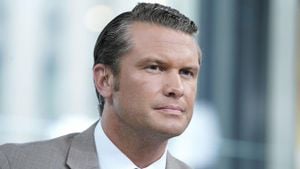Across Kentucky, the shadow of child sexual abuse looms large, often hidden behind walls of silence and stigma. For years, survivors have struggled to navigate their pathways to justice, encountering legal barriers and societal skepticism at every turn. Yet amid this challenge, lawyers and advocates are tirelessly working to shed light on these difficult cases, striving to bring accountability to those who harm the most vulnerable among us.
It was October 2023 when attorney Tad Thomas stood before the Kentucky Supreme Court, ready to advocate for significant changes to the state’s laws on child sexual abuse. He wasn't just representing one client; he was fighting for the rights of countless survivors who might never have the chance to speak up if the statute of limitations remains so short. “A study found nearly 45% of male and over 25% of female child sexual abuse victims delayed their disclosure by more than 20 years,” he argued, referencing research from advocacy group Child USA. This data starkly highlights the uphill battle many survivors face—finding the courage to come forward after decades of silence.
Prior to legislative updates made in the last few years, Kentucky’s statute of limitations aligned with personal injury claims, allowing just one year for victims to file suits against their abusers. Unfortunately, this was significantly unhelpful for many survivors. But, changes enacted first to five years, and then expanded to ten years, were insufficient for those whose abuse occurred long before these modifications. Thomas’ client, Samantha Killary, is one such survivor whose ordeal began back in the 1990s. He presented her case as emblematic of the broader systemic issue, aiming for retroactive eligibility for those who have lost their chance at justice due to even older laws.
Sadly, when the court ruled against opening this revival window, it was not just Killary who lost out. Many victims—those who finally gathered the courage to come forward—were left without recourse. It was disheartening but typical of the challenges faced by advocates like Thomas, who believes strongly, “No victim should ever assume they don’t have a case. Each situation is unique and deserves careful examination.”
Legal practitioners across the state, including Jonathan Hollan from Lexington and Vanessa Cantley from Louisville, echoed Thomas’ sentiments, emphasizing the immense difficulty they face tackling these cases. Both lawyers have, unfortunately, observed firsthand how the existing laws favor abusers over victims, particularly as many cases become time-barred. “The system makes it incredibly tough, whether it’s the elapsed time or liability concerns,” Hollan noted, driving home the frustrating reality for many survivors seeking redress.
Cantley, who combines her expertise as both attorney and psychologist, has grown increasingly disturbed by the state’s rigid limitations on filing abuse claims. “Most survivors don’t come forward until midlife; those with established remedies find their time has passed,” she lamented. Her most recent case involves the alleged abuse of her client by former Manual High football coach Donnie Stoner, highlighting just how stubborn these legal challenges can be. With each new case, Cantley hopes to push against the restrictive laws, even if their disheartening conclusions leave survivors feeling let down.
The stakes are undeniably high. With at least 80 documented allegations of child sexual misconduct against school coaches across the state over the past 15 years, what more must happen before decisive action takes place? The Courier Journal’s extensive discovery made it general knowledge: this isn’t simply about one school, one predator, or even one law. It’s about systemic change. Given this reality, the focus must turn to advocacy efforts aimed at both prevention and accountability.
Recent legislative proposals, such as House Bill 275, aim to prevent abusive educators from simply moving from one school district to another, effectively escaping accountability. Yet, this bill saw no progress before the last session ended, highlighting the difficulties advocates face when trying to shift institutional inertia. Rep. James Tipton, the bill’s sponsor, stated plainly, “We have a responsibility to protect our students,” but as the legislative process has shown, walking this talk is far easier said than done.
Meanwhile, proposals like Jenna and Erin’s Laws seek preventative measures, emphasizing the importance of teaching children early about personal safety and recognizing inappropriate behavior. While this model policy has been adopted by 36 states, including all bordering Kentucky, this state has yet to implement such necessary training. Advocates like Billie-Jo Grant stress the urgency of these trainings—making them as routine as fire drills or other emergency practices—arguing, “It’s about making personal safety assessments on par with every other aspect of children’s well-being.”
Each of these initiatives shows promise, yet achieving actionable change is hampered by longstanding misconceptions about sexual abuse and societal reluctance to address the issue directly. “The real question is how to persuade those entrusted with our children to take these claims seriously,” said Moore, co-founder of The Army of Survivors, which promotes trauma-informed approaches to reduce the stigma surrounding sexual abuse survivors. Educators, coaches, lawmakers—everyone involved must meld awareness with action.
Among the efforts underway, the compassionate training program targeted at coaches helps to bridge the gap, empowering adults responsible for children. This eight-week online course seeks to educate coaches about trauma impacts, equipping them to deal with sensitive issues appropriately. Past survivor stories also serve as powerful motivators for change, illustrating firsthand the need for vigilance and accountability. “Step one is simply believing victims. Encourage reporting to law enforcement,” said Moore, summarizing the elusive but necessary first step.
While many individuals are working toward change, the dismally few who report cases present their challenges. Federal Title IX laws require compliance on the part of all school districts, yet many fail to do so. Not even half of Kentucky's districts fulfill the basic requirements, indicating there is much work left to be done. Advocates encourage involvement from parents and community members, urging vigilance when following up on the regulations set to protect students.
To this day, efforts to hold sexual predators accountable continue to meet barriers at every level—from survivors feeling safe enough to come forward, to the protective laws desperately needed for those who do. Many lawyers remain undeterred, vowing to continue the fight on behalf of their clients until the system either breaks or bends to the will of justice. They maintain, along with survivors, the hope for meaningful, lasting change.
With states surrounding Kentucky leading the way on legislative reform and preventative measures, advocates are calling for momentum to shift decisively toward prioritizing the safety and support of child survivors. Despite the pervasive challenges and grim statistics, the continuous drumbeat of advocacy calls for reformed laws, increased training, and unfailing support for survivors. Many of them understand far too well: it’s those who bravely share their stories who truly hold the power to spark transformative change.
Though Kentuckians are still struggling against deeply entrenched legal and social barriers, the ripple effects of these efforts can already be seen, and there’s hope for future generations of survivors. Together, they are changing the narrative around child sexual abuse—pushing for accountability, education, and most of all, justice.



